



Zikhron Ya'akov is a town in Israel, 35 kilometers south of Haifa, and part of the Haifa District. It is located at the southern end of the Carmel mountain range overlooking the Mediterranean Sea, near the coastal highway no.2. It was one of the first Jewish settlements of Halutzim in the country, founded in 1882 by Baron Edmond James de Rothschild and named in honor of his father.
Zikhron Ya'akov was founded in December 1882 when 100 Jewish pioneers from Romania, members of the Hovevei Zion movement, purchased land in Zammarin. The difficulty of working the rocky soil and an outbreak of malaria led many of the settlers to leave before the year was up.
In 1883, Baron Edmond James de Rothschild became the patron of the settlement and drew up plans for its residential layout and agricultural economy. Zikhron was one of the first Jewish agricultural colonies to come under the wing of the Baron (along with Rishon LeZion and Rosh Pinna), who renamed it in memory of his father, James (Ya'akov) .
To accomplish his first objective, Baron de Rothschild brought in planners who designed and allotted housing lots along the main road for the use of settlement farmers. Each lot included a house facing the street, a long interior courtyard and a rear building for storing agricultural implements. The French-inspired architecture included tiled roofs and painted wooden windows. Each farmer was given a salary and placed under the direction of the Baron's clerk. The Baron also commissioned the construction of the Ohel Ya'akov Synagogue, named after his father, to serve the town. Sparing no expense to build the edifice, the synagogue features a majestic ark made of white marble. The synagogue opened in 1886 and has conducted daily prayer services continuously to this day.
Following a number of economic failures, in 1885 Rothschild helped to establish the first winery in Israel, Carmel Winery, together with a bottling factory, in Zikhron Ya'akov. This was more successful economically although it was initially short-lived as in 1892 the grapevines succumbed to phylloxera, a type of parasite. After a brief set-back, American seedlings which were resistant to phylloxera were grown and the winery began to flourish. Today, the winery remains in action, as do the huge wine cellars that were carved into the mountain over a century ago. In 1954, the remains of Baron Edmond de Rothschild were reinterred in Zikhron Ya'akov.
Zikhron Ya'akov came to fame during World War I for the establishment of the Nili spy ring by Sarah Aaronsohn, together with her brothers, Aaron (a noted botanist) and Alex, and their friend Avshalom Feinberg. The group volunteered to spy on Ottoman positions and report them to British agents off shore. In September 1917, the Ottomans caught one of Sarah's carrier pigeons and cracked the Nili code. In October, they surrounded Zikhron Ya'akov and arrested Sarah and several others. After four days of torture, they planned on transporting Sara elsewhere, she requested to be taken home to change her clothes and shot herself with a pistol hidden in her bathroom and died after several days. The Aaronsohn House–Nili Museum recreates the history of this period.
Today, the original Carmel-Mizrahi Winery continues to make wine and the town draws many tourists attracted to its picturesque setting and historic city center whose restored main street of landmark buildings, called Derekh HaYayin ("Path of the Wine") with houses coffeehouses and boutique shops selling locally-made crafts, jewellery, and antiques, especially on the town's famous "Midrachov" (Rechov haMeyasdim —The Founders Street).
Openning hours:Day and Night
Price: Free.
Phone: N/A
Location: 35 km south from Haifa.
Website: N/A
Haifa - Zikhron Yaakov
Israel top destinations

